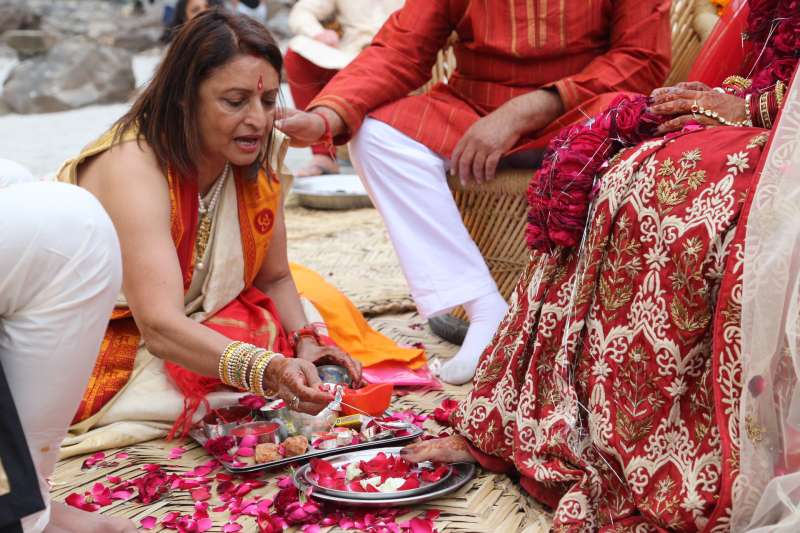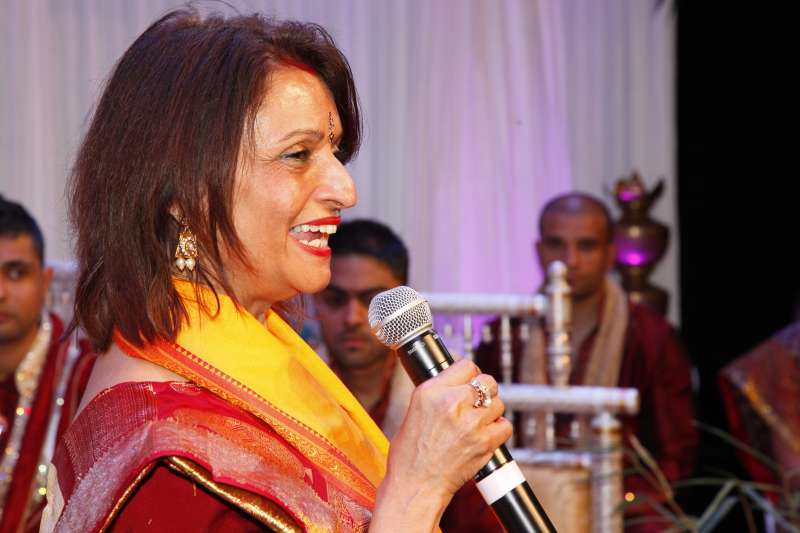Leicester-based Chanda Vyas is a loving mother and wife and an active social worker. But what makes her special is the fact that she’s the first female Hindu priest in the UK to perform her daughter’s wedding thus creating ripples in the male-dominated profession.
As a child, she grew up watching male priests including her father practice priesthood.
Although, Pandit Vyas comes from a Brahmin family where priesthood is practiced, no one expected her to learn the sacred mantras and chants. Having achieved her childhood dream, she also provides funeral services which again is culturally unacceptable for a female to practice especially in a Hindu society.
Pandit Vyas is an inspiration to many Hindu women who want to become priests like her, writes Anjana Parikh
AL: Now, you’ve become the first mother to perform puja in a daughter’s wedding? What was your feeling? Did you look for any other priest to do the service?

Chanda: I felt extremely happy to have the chance to perform my daughter’s wedding. It was a highly emotional experience as one cannot split themselves from the role of a mother whilst performing the role of a priest. However, I felt that there is no love purer than that of a mother to her child and I wanted to maintain that energy in the mandap, with my daughter and the family so we did not look for any other priest.
AL: The Asian community is expected to hold back when it comes to women in unconventional fields. How did you manage to break the glass?
Chanda: First of all, neither do I expect nor have I experienced the Asian community to hold back. If you see in the media, Asians of Indian origin have proved themselves again and again to be adaptive and progressive from the time they left India to the present where they are raising new generations all over the world.
From my own experience, I have come across some people who were surprised that a woman could perform the role of a priest. Mostly, however, this question came from curiosity rather than ignorance and I was able to explain to them that there are no rules in Hinduism that dictate what roles a woman or man can perform and that, many of our traditions today have stemmed from cultural rather than religious reasoning.

AL: Why and when did you decide to become a priest?
Chanda: Being a priest was my childhood dream. I was, however, surrounded by my father who performed the role and so did many other men in my life, I was therefore always learning through them. It was in my later years as my daughters grew up and completed their university and I had some more time that I decided to take it more seriously.
AL: Were you apprehensive before venturing into this field?
Chanda: Yes, of course. I was apprehensive about entering into the field. I had many questions about whether or not I would be good enough and get support from the community. But I had a feeling in my heart that I was going in the right direction and that gave me hope and courage and as it turns out that I had nothing to worry about.
AL: How challenging was it?
Chanda: The challenges have been some of the most rewarding part of the role. These days most wedding ceremonies I perform are quite challenging especially when it comes to the translation of the meaning of our ceremonies in a language that everyone can understand. Although the literal translations of ceremonies are often easy to make, Hindu ceremonies are made up of symbolic gestures that are often interpreted in a range of ways. There are some personal barriers that I have had to overcome such as performing in front of a large number of people but all of it has helped to increase my confidence.
AL: What was the reaction of your family?
Chanda: My family are the ones who have given me the encouragement to go ahead with this move. Without their support, it would have been difficult. It is often said that behind every successful man there is a strong woman. In my case, I have a strong man supporting me.
AL: Where did you study priesthood?
Chanda: I studied with my father who was also a priest and my Guru.
AL: There are great many egos you’ve to contend with. How do you deal with them?
Chanda: Ego is a thing that all of us have. There is no use fighting with them but instead trying to overcome them with love, understanding and mutual respect.
AL: Have you had any difficulties for the simple reason that you’re a woman?
Chanda: No difficulties per se, but I have had a lot of curious people who were not sure about whether or not this is allowed by virtue of Hindu scriptures. Once people get over that fact, it is very easy to move forward and talk of more relevant matters.
AL: You look modern, trendy and fashionable as well. What are the people’s reactions when they see you for the first time?
Chanda: I get mixed reactions when meeting people for the first time as it depends on the type of picture they have in their mind while thinking of a priest. I often have found that people find me quite relatable when they realise that I am a normal woman performing the role of a wife, mother and grandmother whilst at the same time working full time. This has actually helped me to build better relationships with people.
AL: Did you ever have to prove yourself that you’re as good as male priests?
Chanda: I do not believe in competition when it comes to such matters, instead, I believe in co-operation. There are many skills that other priests have that I am learning from and I would like to believe it is the same the other way also.
AL: You’ve introduced tailor-made ceremonies. Is this allowed in Hinduism? Isn’t it against the religion?
Chanda: To suit the type of service according to the needs of the individuals is something that I do offer. There are many parts of the service that are religious and others that are traditional. The sections of the rituals that are religious are customary in all the weddings I perform. However, the parts of the wedding ceremony which are traditional are different for every family; they are the parts that are tailored.
AL: Aren’t you afraid of the criticisms for bringing this trend?
Chanda: Hindu wedding ceremonies have been tailored for centuries and the question of tradition is specific to what type of family one comes from and the beliefs they have. Just within different sects of the Gujarati community, there are different rituals, now imagine a Gujarati marrying a South Indian or a Hindu marrying a Christian. All combinations of marriages have different requirements to fulfil their family traditions. There is no question of criticism in these matters, just ignorance for those who believe that there would be a ‘one size fits all’ approach for all Hindus.
AL: You also do the translation of the slokas as you chant. Please tell us more about this?
Chanda: Whilst it would be very time consuming to translate the very meaning of each Sloka I chant, I do give a general overview of what I am chanting about to keep the guests involved. I feel this is very important to do so for this generation particularly.
AL: Apart from marriage, house warming, you also provide funeral services. First thing that comes into my mind is as per the Hindu sastra, women aren’t allowed to be part of the funeral procession leave alone the funeral services. –Your opinion on this.
Chanda: Again, this is a matter of interpretation. I am a soul, a soul is genderless. It is only in this lifetime that I am performing the role of a woman, a Shakti. There is, to my knowledge, nowhere in the Hindu scriptures where it explicitly states that ‘women aren’t allowed’, I would welcome your advice on this.
AL: I’m sure it wasn’t a cake-walk–if you have to advice a woman to start a career as a priest, what would be your five important tips to her?
Chanda: Be confident; give 100% to your work; give love and respect to everyone; take blessings from your parents and follow your dream, listen to your heart, your heart is on the left hand side but is always right.